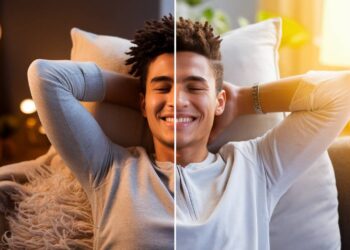Ever wondered why some nights leave you feeling rejuvenated while others drag you down? The answer might lie in your sleep patterns. Sleep trackers are revolutionizing the way we understand and improve our rest, offering personalized insights that can transform your nightly routine. Whether you’re a busy professional, a parent, or an athlete, harnessing the power of sleep technology can lead to better health, enhanced productivity, and overall well-being. Dive into the world of sleep trackers and discover how small tweaks can make a big difference in your sleep quality.
Key Takeaways
- Personalized Sleep Insights: Sleep trackers provide detailed data on sleep stages, duration, and disruptions, enabling tailored lifestyle adjustments.
- Types of Trackers: Choose between wearable and non-wearable options based on your comfort and specific needs.
- Health Benefits: Improved sleep hygiene leads to better mental health, increased energy levels, and enhanced physical performance.
- Integrating with Healthcare: Share sleep data with professionals for customized treatments and ongoing monitoring.
- Practical Tips: Establishing consistent bedtime routines and optimizing your sleep environment are crucial for maximizing the benefits of sleep trackers.
Understanding Sleep Tracking
Figuring out your sleep groove can really shake up your well-being, and knowing the what and why of sleep tracking can help tailor your beauty rest into something a bit more splendid.
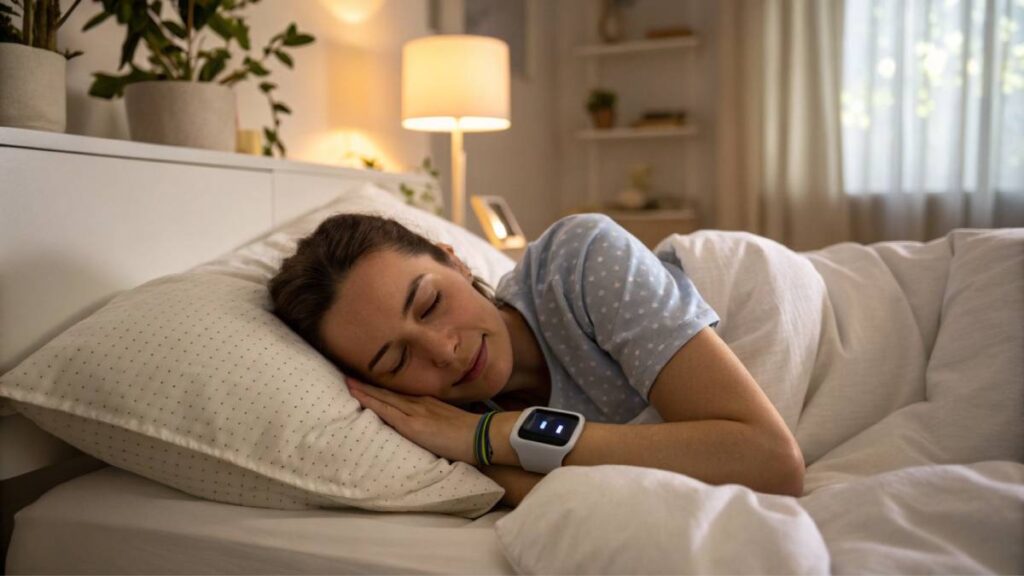
Importance of Tracking Your Sleep
Checking out sleep habits helps you catch what’s throwing your sleep into a tailspin. By keeping tabs on things like how long you’ve snoozed or which sleep stage you’re in, you can tweak lifestyle stuff to snag better Z’s.
This sleep-smart move’s helpful for all sorts of folks:
- Busy go-getters spot what’s blocking their sweet shut-eye.
- Parents fine-tune their rest to ace the next day’s kid-wrangling.
- Seniors adjust to those pesky age-related snooze shifts.
- Chronic condition warriors aim for sleep gold medals.
- Fitness buffs maximize bounce-back time and peak performance.
- Students juggle exams and essays along with sweet sleep.
- Shift workers and globe-trotters tame their wonky sleep timetable.
- Holistic health seekers chase all-around health goodness.
- Insomnia warriors dig up natural snooze fixes.
- Couple dynamics unravel bedtime differences.
Tracking isn’t just number-crunching; it shines light on where to level up, paving the path to feeling fab. Curious about the inner workings of sleep on well-being? Check out our piece on sleep and wellness for the inside scoop.
How Sleep Trackers Work
Sleep gadgets use nifty tech to spy on sleep deets. Getting to grips with these can help you pick the track ‘n’ tell that’s just right for you.
What to expect inside:
- Accelerometers: These detect jiggles. They crunch numbers on your movements to guess which phase of sleep you’re in: light as a feather or deep like a log.
- Heart Rate Monitors: Change-ups in your ticker’s tempo hint at what sleep door you’re passing through. Keeping track tells tales affecting your snooze story.
- Oxygen Checkers: Some gadgets peek at your blood’s oxygen; hiccups here yell things like sleep apnea alarms.
Sleep trackers come in shapes and styles fit for all folks:
- Wearable Trackers: Strap one on your wrist, and these babies gather data while you snooze.
- Non-Wearable Trackers: Slide one under your mattress or bed-side, and skip the wristband.
These gadget insights serve up details that’ll have you rethinking bedtime rituals like spicing up your sleep routine or adding sleep-focused meditation. Taming your night based on gizmo facts can seriously amp up how you feel, day in and day out.
Benefits of Sleep Trackers
Boosting your snooze time with sleep trackers is like having a personal sleep detective on your wrist. They’re like techy alarm clocks but way cooler, giving you the inside scoop on your sleep habits and what’s messing with them.
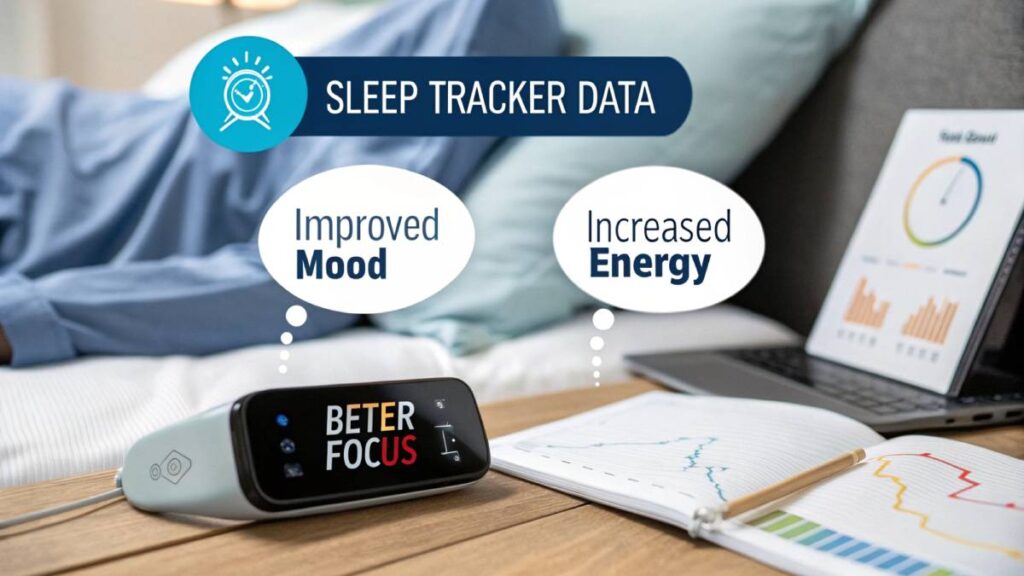
Awareness of Sleep Patterns
Getting a good night’s sleep is more than just hitting the hay and hoping for the best. It’s about cracking the code of your sleep stages—light, deep, and the wild REM adventures.
| Sleep Cycle | How Much of Your Night It Takes Up |
|---|---|
| Light Sleep | 45-55% |
| Deep Sleep | 13-23% |
| REM Sleep | 20-25% |
With these gadgets, you’re like Watson to your own Sherlock Holmes, spotting inconsistencies if you’re not getting enough deep sleep—maybe it’s stress, that sneaky devil, or habits that need a makeover. Factors like late-night snacks, hitting the gym too hard, or what you do before bed can make or break your rest. Check out our articles on sleep routine and meditation for sleep to get the lowdown on nailing your sleep game.
Identifying Sleep Disruptions
What’s worse than missing out on deep sleep? Sleep disruptions creeping in like a cat into your room at midnight. These trackers will point out anything weird, like waking up on the hour or hints of sleep apnea, stuff that’s usually off the radar.
| Disruption Type | What’s Going On? |
|---|---|
| Sleep Apnea | Breathing goes wonky |
| Insomnia | Can’t fall asleep blues |
| Restless Sleep | Wake-up call on repeat |
When you see the data, it’s like a wake-up call—literally. If you’re waking too much, maybe the room’s too hot or bright. Fixing up your sleep zone can be as simple as changing a lightbulb (bedroom optimization for sleep). If insomnia creeps in, natural fixes might do the trick or it might be time for a professional chat (natural sleep aids).
Once you know what’s throwing off your slumber, you can tweak your life—chill-out methods, workouts (exercise and sleep), and what you snack on (diet and sleep). These small steps gleaned from your trusty tracker can help you sleep like a boss. Dive deeper with our guides on stress management for sleep and sleep disorders for more ways to say goodbye to counting sheep.
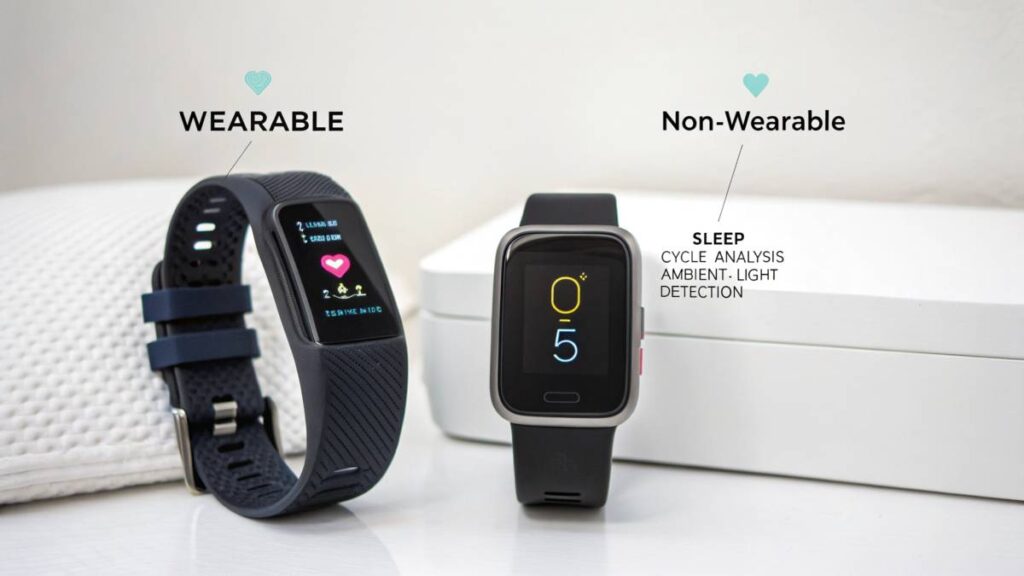
Types of Sleep Trackers
Looking to up your snooze game? Choosing the right gadget for monitoring your shut-eye can make all the difference. Sleep trackers generally fall into two groups: wearable and non-wearable. Each type packs its own punch, catering to diverse needs and lifestyles.
Selecting the right sleep tracker can transform your nightly routine and overall health.” – Michael Thompson, Health Tech Expert
Wearable Sleep Trackers
Wearables are those nifty gadgets strapped to your wrist or tucked into a smartwatch. They dig into your nighttime stats like a detective on a mission, equipped with features that do more than just tell time.
Wearable goodies often boast:
- Sleep Stage Tracking: Gives a peek into how deep you doze off.
- Heart Rate Monitoring: Keeps tabs on how your ticker ticks through the night.
| Feature | Description |
|---|---|
| Sleep Stage Tracking | Keeps an eye on light sleep, deep sleep, and those all-important REM zzzs. |
| Heart Rate Monitoring | Watches how your heart rolls with the punches overnight. |
| Movement Detection | Notices when you toss and turn, painting a picture of your sleep quality. |
| Caloric Burn | Tells you the calories you torch while counting sheep. |
Perfect for gym buffs and those on a performance-boosting binge, these are great for anyone serious about keeping their sleep schedule on track.
Non-Wearable Sleep Trackers
Prefer not to sleep with a gadget hugging you? Non-wearable trackers might be your go-to. These sit quietly under your mattress or on your bedside, gathering insights without touching you. Neat, huh?
Non-wearable trackers usually include:
- Sleep Environment Monitoring: Knows if a noisy TV or chilly room messes with your slumber.
- Advanced Sensors: Checks out your breathing rhythm and spy on your snoring habits.
| Feature | Description |
|---|---|
| Sleep Environment Monitoring | Calculates room vibes like noise and temperature that might mess with your sleep. |
| Advanced Sensors | Finds out how well you breathe, how much you snore, and even if you’re running a fever. |
| User-Friendly Interface | Syncs with apps to break down your sleep stats in a way that even grandma can get. |
| Non-Intrusive | No gadgets strapped on; best for folks who just wanna crash in peace. |
These gizmos work wonders for older folks grappling with sleep shifts, anyone tackling health issues, or couples dealing with differing sleep schedules.
Knowing what these tools offer means you’ve got the intel to boost your sleep setup. Learn how they can tweak your sleep hygiene and even jazz up your sleep mental health to keep you feeling on top of your game.
Features to Look for in Sleep Trackers
Picking the right sleep tracker ain’t just about numbers and charts; it’s about getting the scoop on how you snooze and how that affects your life’s race. Let’s talk about the good stuff you should be shopping around for.
Sleep Stage Tracking
Ever wondered why you wake up feeling like a zombie some mornings and bright-eyed on others? It all boils down to understanding those magical sleep stages. Good trackers give you the nitty-gritty on light snoozes, deep dives, and the REM wonders. This stuff matters, especially if you’re tweaking your shut-eye schedule or tackling sleep troubles.
“Understanding your sleep stages is the key to unlocking restorative rest.” – Dr. Samantha Lee, Sleep Specialist
| Sleep Stage | How Long You Spend (Average) |
|---|---|
| Light Sleep | Half or a little more |
| Deep Sleep | 10-20% |
| REM Sleep | 20-25% |
Heart Rate Monitoring
Your heart’s beat can tell if you’re really sawing logs or tossing around like a hot potato. Those fancy trackers keeping an eye on your ticker are especially handy for folks trying to get their sleep and sweat time in harmony.
| What You’re Doing | Average Heart Rate (bpm) |
|---|---|
| Snoozing | 40-60 |
| Light Mover | 60-100 |
| Full-on Workout | 100-160 |
Sleep Environment Monitoring
While counting sleep sheep and heartbeats, some top-tier gadgets keep tabs on your sleep hangout spot—like room coziness, air quality, and noise. This could be a game-changer for parents whose kiddos are picky sleepers or for anyone making their bedroom a dreamland.
Things to Keep an Eye On:
- Room Temperature: A chill 65°F (18°C) is best.
- Humidity Levels: Stay cool between 30-50%.
- Noise Levels: Keep it down, under 40 dB for a good night.
Adding these extras to your sleep tech helps you crack the code on your sleep and health. Whether you’re aging gracefully, tackling school stress, or pushing for peak athletic prowess, knowledge at this level can seriously help you get good Zs. Dive into more tips with our pieces on sleep hygiene and natural sleep aids.
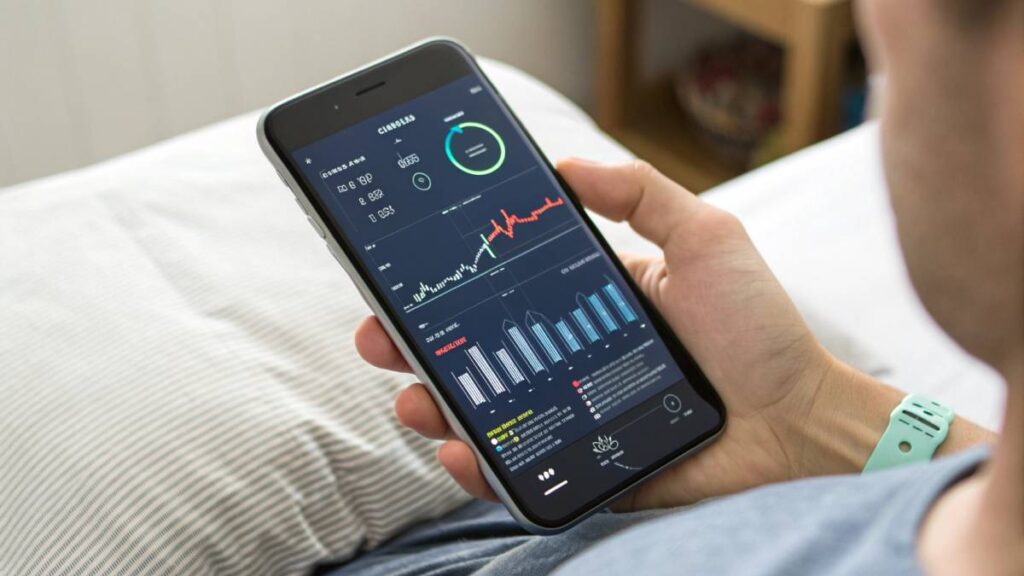
Using Sleep Tracker Data
Making Lifestyle Adjustments
Sleep trackers are like that nosy friend who knows all your bedtime secrets. They give the lowdown on your snooze patterns, allowing folks to tweak their daily habits for better Zzzs. Here’s the scoop:
- Sleep Duration: Count them sheep right! By tracking your total sleep hours, you can juggle your crash and wake-up times to get the rest you need.
- Sleep Stages: It’s not just quantity, it’s quality. Tracking REM and deep sleep stages helps you figure out how restful your sleep is. Tweak your pre-sleep rituals for a richer slumber.
- Sleep Environment: Those mid-sleep wake-ups? Might be your room misbehaving. Adjusting your bedroom’s vibe, like tuning down the noise or dimming lights, can turn your sleep show into a blockbuster. Check our tidbits on bedroom tweaks for sleep for more hacks.
- Bedtime Routine: Consistent sleep schedules rock your overall sleep world. Locking down a steadfast sleep routine is golden for nailing better sleep habits.
Table: Lifestyle Adjustments Based on Sleep Tracker Data
| Data Point | Suggested Adjustment | Internal Link |
|---|---|---|
| Sleep Duration | Shift your bedtime magic | sleep routine |
| Sleep Stages | Try some chill-out techniques | meditation for sleep |
| Sleep Environment | Tweak noise and light blues | bedroom optimization for sleep |
| Consistency | Keep that sleep schedule steady | sleep hygiene |
Consulting Healthcare Professionals
If sleep’s playing hard to get, it’s time to call in the pros. Sleep tracker data’s like a treasure map for healthcare folks, pointing out patterns and problems that might need fixing.
- Diagnosis: The nitty-gritty from your tracker can highlight pesky issues like insomnia or sleep apnea. Catch it early, fix it faster!
- Customized Treatment: Armed with your data, the pros can whip up a sleep-saving recipe just for you. Maybe it’s a bit of cognitive-behavioral magic or a peek at natural sleep help.
- Frequent Monitoring: Keep the tracker rolling to see how well the fix-up is sticking and make tweaks as needed.
- Holistic Approach: The big sleep picture ties into the wellness jigsaw – mental health, stress levels, staying active. It all clicks (sleep and mood, workout and dreamland).
Getting wise with sleep tracker data and having a pro on speed dial is how you tackle sleep issues head on. Better sleep equals better days – who wouldn’t want that?
Factors to Think About When Picking a Sleep Tracker
Finding the right sleep buddy for your wrist or bedside means thinking through a few things. So, let’s chat about making sure it fits your life and is as easy to use as counting sheep.
Does It Keep Up With Your Life?
Your sleep tracker should fit your lifestyle like your favorite pair of jeans. Whether you’re a corporate go-getter, a mom or dad juggling little ones, someone enjoying the golden years, a gym buff, or someone with a wacky schedule, your gadget should slide right into your life effortlessly.
- Workaholics: Pick one that’s all plug-and-play—easy peasy.
- Parents: Go for something that’s got eyes on both you and your little monkey’s sleep.
- Seniors: Find a tracker with a snap-to-charge and understands the quirks of aging sleep.
- Gym Rats: Choose one that pulls double-duty as a fitness tracker.
- Night Owls and Jetsetters: Look for a tracker ready to dance to different time zones.
| Type of User | Stuff to Keep an Eye Out For |
|---|---|
| Workaholics | Easy to set up, low-key upkeep |
| Parents | Handles more than one user, tracks kids too |
| Seniors | Simple to charge, user-friendly gizmo |
| Gym Rats | Tracks your workout grind, keeps tabs on heartbeats |
| Night Owls/World Travelers | Plays well with time zone shifts, flexible use |
Is It Easy to Use?
You shouldn’t need a PhD to work your sleep tracker. A good gadget makes it a cinch to check out your sleep stats, know what’s what, and help you catch better z’s.
- No Getting Lost: Go for a tracker that’s got straightforward buttons and easy-to-find features.
- Easy on the Eyes: Pick one that doesn’t give you a headache trying to read the screen.
- App Goodies: Most trackers come with apps. Make sure it’s as easy as pie to use, and it tells you stuff you actually care about.
- Alerts Just for You: Set up custom reminders to nudge you into better snooze habits.
| Interface Bits | Why It Matters |
|---|---|
| Easy to Use | Quick to dive into data, saves you time |
| Clear Display | No squinting, makes sense of your sleep better |
| App Goodies | Breaks down your snooze stats, handy reports |
| Your Own Alerts | Keeps your sleep on track with personal nudges |
Once you figure all this out, pick a sleep tracker that’s a real best friend for your nights. Get more shuteye with routines and throw in some zen moments with meditation for sleep and give yoga for sleep a go to really up your sleep game.
Tips for Effective Sleep Tracking
Getting a good night’s sleep can make or break your day, so it’s smart to make your sleep tracker work for you. Here’s the scoop on making that gadget earn its keep.
Establishing Consistent Bedtime Routine
Think of bedtime as your brain’s way of shutting down its daily operations. A regular routine tells your body, “Hey, it’s time to chill.” Here’s how you can make it happen:
- Set a Regular Bedtime: Pick a bedtime and don’t cheat on it, even if it’s tempting during weekends.
- Chill Out Before Sleep: Do something relaxing—grab a good book, listen to some relaxing tunes, or try some meditation for sleep.
- Ditch the Screens: A whole hour without screens before bed, trust me, it helps. Blue light from gadgets is like coffee for your brain.
- Turn Your Room into a Snooze Haven: Make your bedroom feel like a cozy retreat. Here’s a guide on bedroom optimization for sleep.
| Bedtime Routine Activity | Description |
|---|---|
| Regular Bedtime | Sleep at the same time nightly |
| Chill Out | Unwind with calm activities |
| Ditch Screens | Avoid gadgets before sleep |
| Cozy Room | Create a snug bedroom |
Using Sleep Tracker Data Wisely
Those stats and graphs are not just for show. Here’s how you can turn your sleep data into better ZZZs:
- Peek at Your Sleep Patterns: Look at your data to spot any weird sleep patterns. Are Tuesdays always sleep-short? Is your deep sleep almost a blink?
- Spot Sleep Bumps: Pin down things that mess with your snooze time—maybe it’s that noisy neighbor or forgetting your bedtime goal. Check out our piece on sleep hygiene for more smarts.
- Make Little Life Tweaks: Base life changes on what your sleep data tells you. Could be what you munch on, as seen in diet and sleep, or starting yoga for sleep.
- Ask the Health Pros: Persistent tossing and turning? Share your tracker insights with a healthcare wizard. They’ve got the know-how to help.
| Insight from Data | Action |
|---|---|
| Sleep Patterns | Spot trends and snooze times |
| Sleep Bumps | Identify noise or light issues |
| Life Tweaks | Change habit based on data |
| Doctor’s Advice | Get expert help when needed |
Put these tips in action, and you’ll turn those sleep tracker numbers into better rest. For more tips on keeping your sleep and health in check, check out sleep and wellness and natural sleep aids.
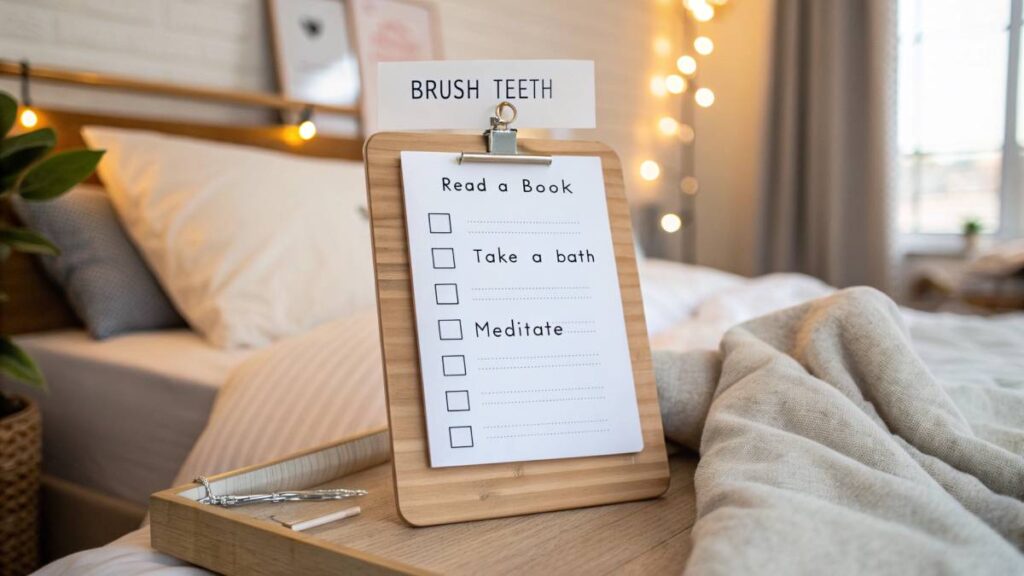
Main Tips
- Establish a Routine: Go to bed and wake up at the same time every day to regulate your internal clock.
- Optimize Your Sleep Environment: Keep your bedroom cool, dark, and quiet to promote uninterrupted sleep.
- Limit Screen Time: Avoid screens at least an hour before bedtime to reduce blue light exposure.
- Use Data Wisely: Regularly review your sleep tracker data to identify patterns and make necessary adjustments.
- Consult Professionals: Share your sleep data with healthcare providers for personalized advice and treatment.
Conclusion
Embracing sleep trackers can be a game-changer for anyone striving to enhance their sleep quality and overall health. By providing in-depth insights into your sleep patterns, these gadgets empower you to make informed decisions about your lifestyle, from adjusting your bedtime routine to optimizing your sleep environment. Whether you’re aiming to boost your athletic performance, manage stress, or simply wake up feeling more refreshed, sleep trackers offer the tools you need to achieve your goals. Moreover, integrating sleep data with professional healthcare advice can address underlying issues like insomnia or sleep apnea, ensuring a holistic approach to your well-being. As technology continues to advance, the potential for personalized sleep improvement grows, making now the perfect time to invest in a sleep tracker. Unlock the secrets of your slumber and take the first step towards better nights and brighter days.
FAQs
What is a sleep tracker and how does it work?
A sleep tracker is a device or app that monitors your sleep patterns by analyzing movements, heart rate, and other physiological signals. It provides insights into sleep stages, duration, and quality to help you improve your rest.
Are wearable sleep trackers better than non-wearable ones?
It depends on your preferences and needs. Wearable trackers offer comprehensive data through wrist-based sensors, while non-wearable options are discreet and convenient, monitoring your sleep environment without being worn.
How can sleep trackers improve my health?
Sleep trackers help identify sleep disturbances and patterns, enabling you to make lifestyle adjustments that enhance sleep quality. Better sleep contributes to improved mental health, increased energy, and overall well-being.
Can sleep trackers detect sleep disorders?
Yes, sleep trackers can identify irregular sleep patterns and potential disruptions like sleep apnea or insomnia. Sharing this data with healthcare professionals can aid in diagnosing and treating sleep disorders.
What should I look for when choosing a sleep tracker?
Consider factors such as the type of tracker (wearable vs. non-wearable), ease of use, specific features like heart rate monitoring or sleep stage tracking, and how well it integrates with other health apps.
Resources
- National Sleep Foundation
Comprehensive guides on the latest sleep tracking technologies and their benefits for improving sleep quality. - Harvard Health Publishing
Articles on how to effectively utilize sleep tracker data to enhance your sleep patterns and overall health. - Mayo Clinic
Trusted advice on establishing healthy sleep habits and understanding the role of sleep technology in maintaining sleep hygiene. - Sleep Research Society
Access to the latest research studies and publications on sleep science and tracking methodologies. - WebMD – Sleep Health
Comprehensive information on various aspects of sleep health, including the impact of sleep trackers on improving sleep quality. - CDC – Sleep and Sleep Disorders
Public health information on sleep disorders, their prevention, and the role of technology in monitoring and managing sleep health. - PubMed Central (PMC)
Access to a vast repository of peer-reviewed studies and clinical trials related to sleep tracking technologies and their efficacy.
Final Thoughts
Investing in a sleep tracker is more than just adopting the latest gadget—it’s a commitment to understanding and improving one of the most vital aspects of your health. By providing actionable insights into your sleep patterns, these devices empower you to make informed decisions that enhance your quality of life. Whether you’re looking to optimize your nightly rest, address specific sleep issues, or simply gain a deeper understanding of your sleep habits, a sleep tracker offers the tools you need. Remember, the journey to better sleep is personal and ongoing, and having the right technology by your side can make all the difference. Embrace the power of sleep tracking and take the first step towards healthier, more restorative nights.
Recommended Products and Accessories
- Fitbit Charge 5
- Track your sleep stages, heart rate, and daily activity with ease.
- Withings Sleep Analyzer
- Monitor your sleep patterns without wearing any device.
- Oura Ring Generation 3
- A sleek, smart ring that provides comprehensive sleep insights.
- Philips SmartSleep Wake-up Light
- Enhance your morning routine with light-based wake-up technology.
- Blanket with Built-in Sleep Tracker
- Experience uninterrupted sleep with integrated tracking technology.






